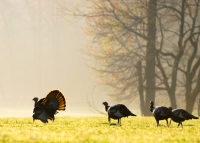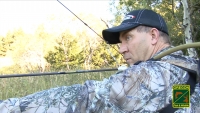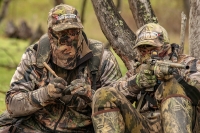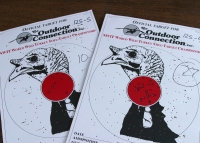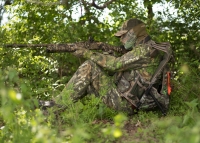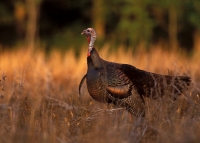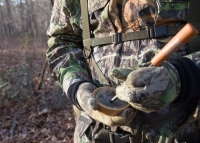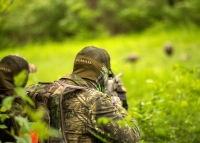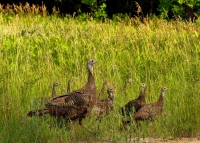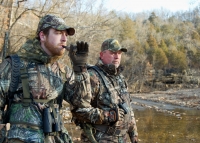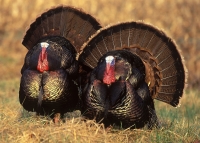
Turkey hunting in Oregon
Why turkey hunting
Turkey hunting is one of the fastest growing kinds of hunting in Oregon, and nationwide, for many reasons!
- Turkeys are plentiful in many parts of the state.
- Oregon offers generous hunting seasons in both spring and fall.
- Turkey hunting doesn’t require a lot of gear.
- The hunting regulations are easy to understand.
- Turkeys are good eating, and bag limits are generous.
- Bagging your own bird for Thanksgiving can become a cool family tradition.
Since their introduction to the state in 1961, Oregon’s turkey population has grown to well over 30,000 today. Throughout that time, ODFW has transplanted over 10,000 birds from established flocks to many new parts of the state.
Wild turkey seasons
Today, there are enough wild turkeys in Oregon to have both spring and fall hunting seasons. The popular spring season opens in mid-April and is one of the most generous in the country. The fall turkey hunting season is even longer at 10 weeks, and opens in mid-October.
|
|
Spring turkey season |
Fall turkey season |
|
Season |
Opens mid-April for six weeks |
Opens mid-October for 10 weeks |
|
Bag limit |
1 male/day, 3 males/year |
1 of either sex/day, 1-2/season* |
|
Tags available |
Unlimited number |
Unlimited number |
*depending on the county
When to hunt wild turkey
Spring is prime turkey hunting season. This is breeding season and successful hunters often set up in a well-camouflaged location and try to call a male turkey into shooting range. To see a male turkey, also called a gobbler, come strutting and gobbling into range is heart-stopping moment for any turkey hunter.
Oregon also has an extended fall turkey hunting season, and the chance to harvest your own Thanksgiving bird!
Where to hunt wild turkey
In western Oregon, most turkeys are found on private land, where they have gravitated to find better food sources and to escape hunters and predators. The exception is southwestern Oregon, which has one the most robust turkey populations in the country, with plenty of them occurring on public National Forest land.
In eastern Oregon, turkey populations are growing, with excellent hunting in many locations including the White River area and the Blue Mountains of northeast Oregon.
The first turkeys introduced into Oregon were the Merriam’s turkey, native to the pine forests of Arizona and New Mexico. In 1975, the state began introducing the Rio Grande turkey, and the two subspecies have hybridized widely.
Today, management efforts focus on the Rio Grande turkey, which has adapted to a wide range of habitat conditions in Oregon.
ODFW turkey hunting resources
If you’re new to turkey hunting, or even just new to turkey hunting in Oregon, ODFW offers several resources to help you learn when and where to hunt.
- The annual Oregon Game Bird Regulations
- Online resources about the upcoming season and current conditions
- Classes and workshops
- Regional wildlife biologists who can help direct you to the best hunting opportunities in their area
Know the rules
The Oregon Game Bird Regulations (both printed and online) will tell you what licenses and tags you’ll need to hunt turkey, when and where hunting seasons are open, and how many birds you can take in a year.
Review the rules and regulations carefully – it’s important. Not only do these rules allow for equal opportunity for all hunters, following them will keep out of trouble with the law.
Regulation booklets are available at most license sales vendors and at ODFW offices. The online version of the regulations is found here.
Learn more online
ODFW publishes the annual Turkey Hunting Forecast in early April, just in time for the spring turkey season. This synopsis includes a district-by-district look at turkey populations in that area, and the outlook for the upcoming season in light of recent winter survival and breeding success.
It also will include helpful information about the kind of habitat in which to find birds in that area.
In addition to the forecast, the ODFW Recreation Report offers seasonal updates as the hunting season progresses.
You can find the turkey forecast and Recreation Report on the ODFW website MyODFW.com.
Sign up for a workshop
Each spring, ODFW offers wild turkey hunting workshops for both youth and adults. These workshops cover all the basics of turkey hunting in Oregon, including hunting seasons, hunting gear, tips for bow and shotgun hunting, turkey behavior, calling turkeys and more.
Check the Workshop and Events page on MyODFW.com in early spring to learn more and register.
Talk to an expert
Local and regional ODFW wildlife biologists are great sources of information about where to hunt for turkeys. They have first-hand knowledge of the turkey populations in their districts and the types of habitat in which they'll be found.
Most of all, they are happy to help both new and seasoned hunters be successful in their hunts.
Here is a map of ODFW district offices, just call and ask to talk to one of the wildlife biologists in the office.

